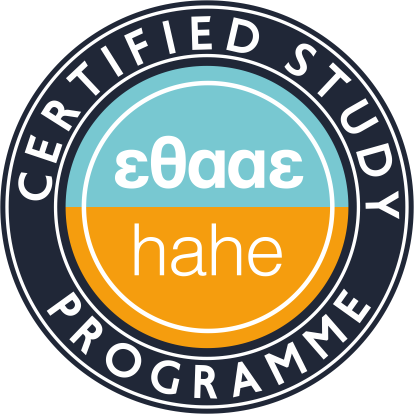Karasavvidis Ilias

Ilias Karasavvidis is an Assistant Professor on Information and Communication Technologies (ICT) and Learning in Preschool Education in the Department of Preschool Education at the University of Thessaly, Greece. He leads the Information and Communication Technologies Research Unit of the Natural Sciences and Technologies Lab in the same Department.
He holds an Honours degree in Teacher Education and a Masters degree in Educational Technology from the University of Crete, Greece, and a Ph.D. in Educational Technology from the University of Twente, The Netherlands. He was a Greek State Scholarships Foundation scholar from 1995 to 1999.
His previous appointments included primary education (2001-05), the Department of Teacher Education of the University of Crete (adjunct staff teaching Educational Technology courses, 2001-05), and the School of Education of the Greek Open University (adjunct staff supervising graduate student research, 2006-10).
He has taught undergraduate courses and lectured in graduate courses at the Universities of Crete and Thessaly. His teaching experience is also extensive at the in-service teacher training levels as he has lectured in four major, EU-funded teacher-training programmes over the last decade at the Universities of Crete and Thessaly. He was the scientific supervisor of the three in-service teacher-training programmes in ICT organised by the University of Thessaly between 2007-2019.
His professional activities involve one editorial board position, one guest editorial, and peer reviews for several international refereed journals. He has also served in the scientific and programme committees for several international and national conferences. He is also a member in several international and national professional organisations.
His primary research interests include ICTs and their applications to the teaching and learning process on the primary, tertiary and in-service education levels. More specifically, his current research interests involve ICTs as cognitive tools, learning and teaching with Web 2.0 technologies, learning with digital media, digtial video, serious games, machine learning, and Open Source/Content practices in education.
He has published widely on technology-mediated learning in several areas of primary, tertiary, and in-service education. His work has been published in international and national refereed journals, books, and conference proceedings.
Selected Refereed Publications
Ragazou, V. & Karasavvdis, I. (in press). The Effect of Cueing and Practice Type on Complex Software Training Cueing and practice on complex software training. Journal of Computer Assisted Learning.
Ragazou, V. & Karasavvdis, I. (in press). Does the use of cueing in videotutorials facilitate the learning of complex software applications? An experimental study with experienced ICT learners. Themes in E-Learning.
Vourletsis, I., Politis, P., Karasavvidis, I. & Karagiannidis, C. (in press). Comparing the effects of different types of computational thinking activities on students’ debugging proficiency level and strategy use. In S. Demetriadis & T. Tsiatsos (Eds.). Research on e-Learning and ICT in Education: Technological, Pedagogical and Instructional Issues. Springer.
Karasavvdis, I. (in press). Harnessing the power of gamification: a case study of how it re-configures the activity system of an undergraduate course. In F. Perez Marzullo (Ed). Practical Perspectives on Educational Theory and Game Development. IGI Press.
Koutsakas, P., Karagiannidis, C., Politis, P. & Karasavvidis, I. (2020). A computer programming hybrid MOOC for Greek secondary education. Smart Learning Environments, 7(1), 1-22.
Karasavvidis, I. (2019). Color signification in digital multimodal compositions: A descriptive analysis of undergraduates’ digital videos. Punctum: International Journal of Semiotics, 5(1) 67-91.
Karasavvidis, I. (2019). Students’ use of digital video effects in multimodal compositions: an exploratory study. Journal of Visual Literacy, 1-24.
Karasavvidis, I. (2018). Educational Serious Games Design: An Overview. In M. Khosrow-Pour (Ed.). Encyclopedia of Information Science and Technology, 4th Ed (pp. 3287-3295). IGI Global
Laschou, S., Kollias, V., & Karasavvidis, I. (2018). How Do Transformational Principals View ICT as a Means for Promoting Educational Innovations? A Descriptive Case Study Focusing on Twenty-First Century Skills. In A. Mikropoulos (Ed). Research on e-Learning and ICT in Education (pp. 43-67). Springer, Cham.
Karasavvidis, I. & Kollias, V. (2017). Understanding Technology Integration Failures In Education: The Need for Zero-Order Barriers. In M. Walford & A. Sidorkin (Eds.). Reforms and Innovation in Education - Implications for the Quality of Human Capital. NY: Springer.
Karasavvidis, I. (2017). The Design, Implementation, and Evaluation of a Two-Layer Peer Assessment Scheme in an Undergraduate Course Wiki: Findings from a Case Study. In P. Anastasiades & N. Zaranis (eds.), Research on e-Learning and ICT in Education (pp. 133-145). Springer International Publishing.
Theodosiou, S., & Karasavvidis, I. (2015). An Exploration of the Role of Feedback on Optimizing Teachers' Game Designs. Bulletin of the IEEE Technical Committee on Learning Technology, 17(4), 2.
Sakkas, A. & Karasavvidis, I. (2015). Optimizing learning from educational games: a qualitative exploration of teacher-mediated gameplay. Journal of Game-Supported Interactive Learning, 1(1), pp. 23-33.
Theodosiou, S. & Karasavvidis, I. (2015). Serious games design: a mapping of the problems novice game designers experience in designing games. Journal of e-Learning and Knowledge Society, 11(3), 133-148.
Karasavvidis, I. & Theodosiou, S. (2014). The use of digital texts as an alternative method of determining functional ICT literacy levels. International Journal of Digital Literacy & Digital Competence, 5(4), 19-32.
Karasavvidis, I. & Kollias, V. (2014). Technology Integration in the Most Favorable Conditions: Findings from a Professional Development Training Program. In. C. Karagiannidis, P. Politis & I. Karasavvidis (Eds). Research on e-Learning and ICT in Education Technological, Pedagogical and Instructional Perspectives (pp. 197-224). NY: Springer.
Citations - GoogleScholar
http://scholar.google.gr/citations?user=5KL8ZrsAAAAJ&hl=en
